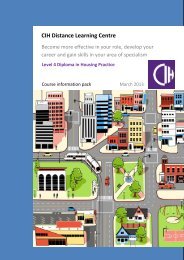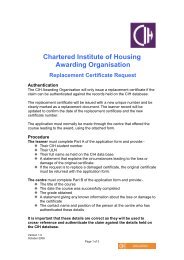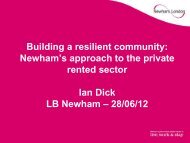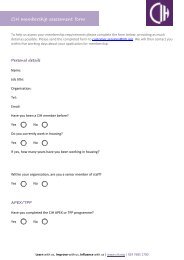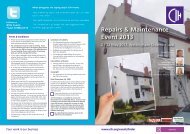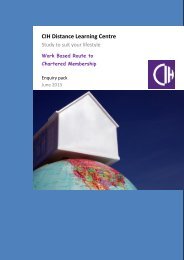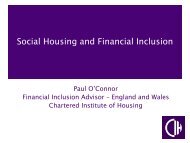View publication - Chartered Institute of Housing
View publication - Chartered Institute of Housing
View publication - Chartered Institute of Housing
Create successful ePaper yourself
Turn your PDF publications into a flip-book with our unique Google optimized e-Paper software.
PART ONE: LEARNING TODAY<br />
MSc <strong>Housing</strong> Studies, there is a responsibility to ensure housing practitioners today have<br />
the framework they need to undertake, with competence and confidence, such diverse<br />
tasks as working with private sector landlords, negotiating on development<br />
opportunities, advising customers on welfare reform, planning for new homes and<br />
collaboratively commissioning services, as well as the technical, legal and management<br />
functions that are needed.<br />
Engaging with employers<br />
At DMU we talk to employers in our region about the skills and knowledge they think<br />
are necessary and important for housing staff to meet the new challenges. This is done<br />
in a variety <strong>of</strong> ways, for example an annual event we hold at DMU in partnership with<br />
the CIH East Midlands Board brings together a large group <strong>of</strong> pr<strong>of</strong>essionals. I am also<br />
involved in the Higher Level Skills project run by Asset Skills which supports networks<br />
between Higher Education Institutions (HEI) and employers. Together, DMU and Asset<br />
Skills have run seminars, such as one for Midlands housing employers in March 2013 on<br />
‘The Future <strong>of</strong> <strong>Housing</strong> Education – 2020 Insight’. Participants at that event were asked<br />
what they wanted from higher education courses; this was not focused on curriculum<br />
content but more generic issues. Employer responses suggested they wanted a course<br />
which would achieve the following outcomes:<br />
• Enhance research and enquiry skills.<br />
• Increase personal effectiveness and good communication.<br />
• Develop critical thinking skills and intellectual autonomy.<br />
• Work increasingly across disciplines.<br />
• Meet the needs <strong>of</strong> employers.<br />
In addition employers wanted housing education which was <strong>of</strong> good quality as<br />
determined by the reputation <strong>of</strong> the HEI and the expertise <strong>of</strong> tutors, and they wanted<br />
flexible modes <strong>of</strong> delivery and value for money. There was a debate on course<br />
accreditation by a pr<strong>of</strong>essional body and this was seen as something more important to<br />
the individual student than the employer per se.<br />
The question: ‘which pr<strong>of</strong>essional body?’ was raised by participants suggesting that,<br />
increasingly, organisations like the Royal Institution <strong>of</strong> <strong>Chartered</strong> Surveyors (RICS), the<br />
<strong>Chartered</strong> Management <strong>Institute</strong> (CMI) and the <strong>Institute</strong> <strong>of</strong> Leadership and Management<br />
(ILM) were relevant to them – CIH is not the only game in town. There is clearly work<br />
that CIH, in partnership with HEIs, must do to make organisations see the value in<br />
30





